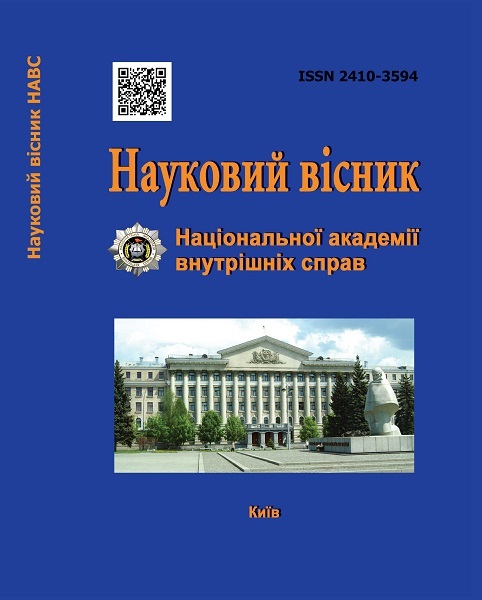Intermediary of Criminal Police Subsidiaries and Advanced Examination Agen-cies at the Time of Documentation of Criminal Legal Execution
Abstract
The purpose. Definition of the notion and essence of interaction of criminal police units with pre-trial investigation agencies during documenting criminal offenses, as well as the definition of certain problem issues related to its implementation. Methodology. During writing, scientific methods of analysis, induction and deduction were used. The theoretical basis for the writing of the article was the work of domestic and foreign scholars devoted to problematic issues of the activities of pre-trial investigation agencies and criminal police units, as well as regulatory acts regulating their interaction. Scientific novelty. The scientific novelty of the publication is a systematic analysis of the essence of the interaction of criminal police units with pre-trial investigation agencies during the documenting of criminal offenses. The reasons for the implementation of the interaction, its principles, and the concept of actual data as the main constituent of interaction within the framework of information exchange are presented. It has been established that documenting carries a lot of semantic loads, which are combined in concerted activity aimed at achieving the goal, accomplishing tasks or achieving the result. Conclusions. Documenting as an independent element of evidence is ineffective. In order to bring the perpetrator to criminal responsibility, the results of documentation should be «legalized» in the criminal procedural law by conducting investigative (search) actions. In order to effectively ensure the implementation of justice, it is necessary to apply in the complex the operational-search and criminal-procedural, as well as other branches of law, which is conditioned and realized in the interaction of their subjects. On the basis of the analysis, the actual determination of the interaction of the criminal police units with the pre-trial investigation agencies during the documenting of criminal offenses is proposed.Keywords: interaction; subject; criminal police; secret investigative (search) actions; actual data; documentation.
Downloads
Abstract views: 200 PDF Downloads: 638
- Authors reserve the right to authorship of their own work and transfer to the magazine the right of the first publication of this work under the terms of the Creative Commons Attribution License, which allows other persons to freely distribute published work with mandatory reference to authors of the original work and the first publication of an article in this magazine.
- Authors have the right to enter into separate additional agreements on non-exclusive dissemination of the work in the form in which it was published in the journal (for example, to post an article in the institution's repository or to publish as part of a monograph), provided that the link to the first publication of the work in this journal is maintained.
- The journal's policy allows and encourages the posting of articles by authors on the Internet (for example, in electronic storehouses of institutions or on personal websites), both before the submission of this manuscript to the editorial office and during its editorial processing, as this contributes to the creation of a productive scientific discussion and positively affects the efficiency and dynamics of citing the published work.




